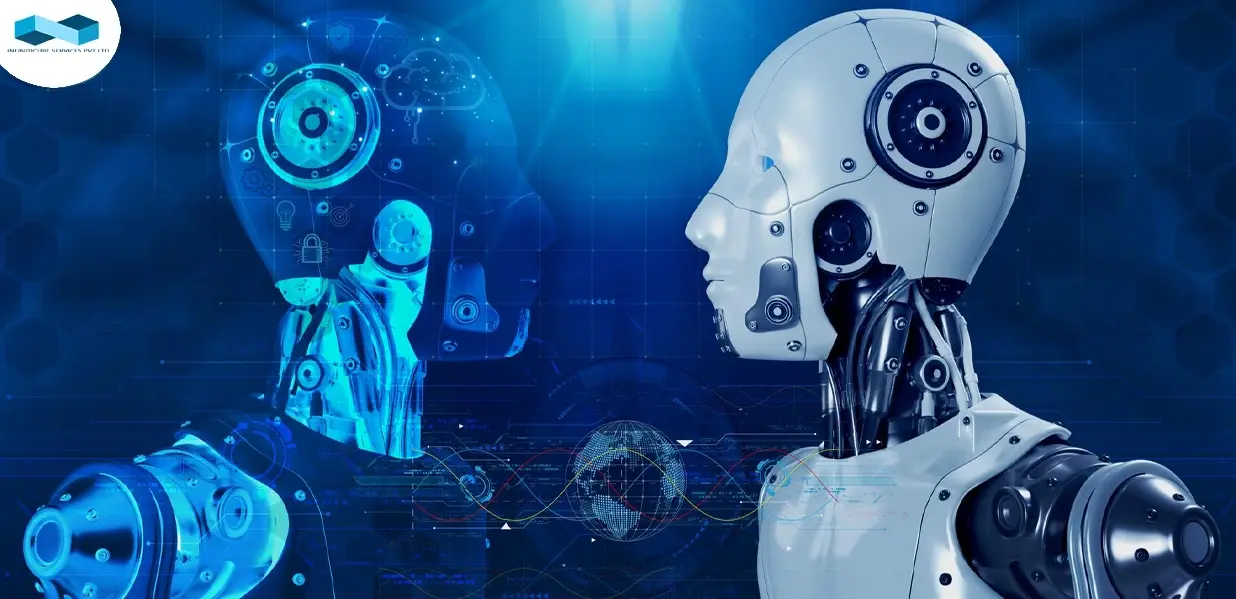How Generative AI Reshaping Industries
Artificial intelligence (AI) generative technology has emerged as a game-changer in today's quickly changing digital landscape, revolutionizing industries all over the world. With the use of this innovative technology, content, graphics, and even full experiences may be created and generated that were before unthinkable.
The impact of AI generative technology is broad, changing everything from marketing and advertising to design and entertainment. It also changes how organizations function and interact with their clients. Artificial intelligence (AI) generative technology is transforming industries by offering individualized and hyper-targeted solutions thanks to its capacity to analyze enormous volumes of data and learn from trends.
In this blog, we set off on an enthralling voyage into the realm of AI generative models and investigate how they have transformed business, leaving an imprint on fields as diverse as manufacturing and healthcare.
10 AI Generative Examples in Various Industries
By enabling new capabilities and efficiencies, AI generative models have actually demonstrated significant potential for altering a variety of industries. AI generative models have had an impact on a number of industries, including:
Art and Creativity
A relatively new idea that has gained popularity in the art industry is generative AI in art and creativity. A type of artificial intelligence (AI) called AI generative is able to produce unique works of art or other content using data sets and algorithms. It is a potent tool that enables painters, designers, and other creators to explore fresh creative avenues and produce one-of-a-kind works of art.
There are several ways to create art with Artificial Intelligence Generative. It can be used to make digital photos, 3D models, music, and even video, for instance. Art produced using algorithms is known as generative art, and it can also be produced using generative AI. Since it is produced using a variety of techniques, generative art is frequently abstract and extremely distinctive.
Entertainment
A relatively new idea that has gained popularity in the entertainment sector is generative AI in entertainment. It is a sort of technology that can produce original material depending on user input. Stories, music, graphics, and other forms of entertainment are produced by this kind of AI.
Because it doesn't rely on predetermined rules or algorithms, it differs from standard AI. Instead, it uses deep learning methods to provide original and surprising material. This indicates that AI can produce more imaginative and interesting content than would be feasible with conventional AI.
Design and Fashion
The subject of generative AI in design and fashion is expanding quickly and has the potential to completely change how we produce and use clothing. Artificial intelligence, often known as generative AI, is a sort of machine learning that enables computers to produce original concepts and layouts based on previously collected data. Custom designs for apparel, accessories, and other fashion accessories can be produced using this technology.
It functions by studying existing data and leveraging that analysis to provide fresh concepts and designs. A generative AI system, for instance, may examine a database of fashion trends and utilize that information to produce brand-new designs that are based on the most recent fashion trends. This kind of AI can also be used to produce customized designs for specific clients, enabling them to make one-of-a-kind items that express their own sense of style.
Healthcare
AI Generative may create new data from existing data, enabling more precise and individualized therapies. It is being utilized to provide individualized medical therapies, enhance the accuracy of diagnoses, and lower healthcare expenses.
In order to evaluate vast amounts of data and produce fresh insights, it employs machine learning algorithms. For instance, it can make predictions about a patient's health using information from test results, medical pictures, and patient records. This can aid medical professionals in their decision-making regarding diagnoses and treatments.
Gaming
AI Generative creates new material from previously collected data using machine learning techniques. This technology can be used to make virtual worlds and locations, as well as new video game levels, characters, and stories.
Some of the top video games on the market already make use of it. For instance, generative AI is utilized in the game No Man's Sky to generate an infinite universe with billions of planets and galaxies. The maps and civilizations in the video game Civilization VI are made specifically for each game using generative AI.
Advertising and Marketing
An emerging technology called generative AI in advertising and marketing has the power to completely change how companies promote their goods and services. It creates new material from previously collected data using machine learning techniques. For businesses, this technology can be used to produce distinctive and personalized ads, content, and campaigns.
Additionally, this technology can be utilized to spot patterns in consumer behavior and develop more successful marketing efforts. For instance, a company might utilize generative AI to pinpoint clients who are most likely to buy a specific good or service, and then develop a focused advertising campaign to attract those consumers.
Architecture and Urban Planning
A relatively recent idea that has the potential to completely change how cities are planned and constructed is generative AI in architecture and urban design. Generative AI, uses algorithms to produce original responses to challenging issues. Using this technology, creative solutions that are more effective, affordable, and sustainable have been produced in a number of different industries, including architecture and urban planning.
It can also be used to model future scenarios for the appearance and operation of cities. For instance, generative AI can be used to build virtual representations of cities that can be tested to see how various scenarios will impact their infrastructure, economies, and environments.
Language Translation and Natural Language Processing (NLP)
A promising new area of study, generative AI in language translation and natural language processing (NLP), has the potential to fundamentally alter communication. Text can be translated from one language to another using generative AI, which creates natural language from given data using deep learning algorithms. The accuracy and speed of translations could be increased by this technology, facilitating cross-cultural and language communication.
Finance and Trading
Numerous applications of generative AI are found in the financial industry. It can be used, for instance, to develop new financial products, such as derivatives, or to spot fresh trading opportunities. By identifying trends in the data and forecasting future market moves, it can also be utilized to improve already-existing trading techniques.
We can use it to swiftly and precisely analyze vast amounts of data. Trading decisions can then be improved as a result of more precise information. AI is able to spot patterns and trends in vast datasets that may not be visible to humans. This can improve traders' chances of success by enabling them to make better-informed judgments.
Manufacturing and Product Design
To produce new designs, generative AI uses previously collected data. It can assess current goods and procedures to find areas that could be improved, then produce new designs that deal with those problems. For instance, it can be utilized to develop a brand-new product design that is more effective or economical than the one that is currently on the market. Additionally, it can be utilized to develop brand-new production procedures that are cheaper and more effective than current ones.
Understanding the Impact of AI Generative on Reshaping Industries
AI generative models have a broad and profound impact on industries, changing many elements of operations and procedures. Here are some significant effects of AI generative models on various industries:
Innovation and creativity
AI generative models have transformed creativity by producing original and fresh ideas, designs, and content. They have developed into a potent tool for writers, designers, and artists, inspiring them and expanding the realm of what was previously thought to be possible.
Efficiency and Automation
AI generative models have automated repetitive processes and optimized workflows in sectors including design, manufacturing, and content development. Businesses are able to create more in less time and devote human resources to more intricate and strategic tasks because to this increased efficiency.
Personalization
By producing content that is specifically catered to user preferences, AI generative models can offer customers personalized experiences. By improving customer engagement and happiness, firms can boost customer loyalty and income.
Cost Savings
AI generative models can help businesses drastically reduce expenses by automating operations and lowering manual labor. AI, for instance, may streamline production processes and lower material waste in the manufacturing industry, saving money.
Decision Support and Forecasting
AI generative models may produce scenarios and projections in sectors like finance, assisting firms in making more informed decisions and managing risks more successfully.
Data Augmentation
In fields like healthcare, where gathering huge and diverse datasets may be difficult due to privacy concerns, AI generative models can produce synthetic data that can be used to augment genuine datasets.
Enhanced User Experience
By creating content and characters that are specific to individual interests, AI generative models has a positive impact on more immersive and engaging user experiences in sectors like gaming, entertainment, and social media.
Accelerated Research and Development
AI generative models can help researchers generate potential chemical structures, hastening the process of discovering new therapies and treatments, in areas like drug development.
Improved Security
AI generative models have been used in cybersecurity to identify and produce security threats, enabling organizations to better protect and prepare for prospective assaults.
Enhanced Accessibility
AI generative models can be used to develop assistive technology, increasing the accessibility of goods and services for people with impairments.
Conclusion
In conclusion, AI generative technology is reshaping industries by providing personalized and hyper-targeted solutions. From healthcare to finance, manufacturing to art and design, the impact of AI generative is evident in every sector. By analyzing vast amounts of data and learning from patterns, AI generative algorithms enable businesses to make data-driven decisions, enhance creativity, and stay ahead of the competition.
However, addressing ethical considerations and using this technology responsibly is essential. As we look to the future, the possibilities of AI generative are limitless, unlocking new opportunities and pushing the boundaries of innovation like never before.
Embrace the future of business with generative AI services. Join the ranks of industry leaders who are already leveraging AI's potential to drive innovation, efficiency, and personalized experiences. Don't let your competitors outpace you - take the leap into the world of generative AI services and reshape your industry today. To get on board with that, contact us now!
 June 27, 2025
June 27, 2025
 Balbir Kumar Singh
Balbir Kumar Singh
 0
0
 June 13, 2025
June 13, 2025
 Balbir Kumar Singh
Balbir Kumar Singh
 0
0









Leave a Reply